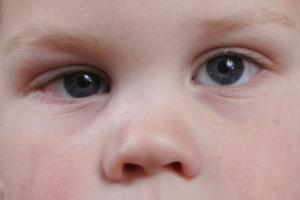Squint
A squint (strabismus) is where the eyes point in different directions. It can occur at any age but is more common in young children. One eye may turn in, out, up or down, while the other looks ahead. Get medical advice if your child has a squint.
When to get medical advice
About two in every 100 children in the UK have a squint.
In most children, there is no cause identified, but it can also be a sign of problems, such as reduced eyesight.
You should get advice if:
- your child has a squint all the time
- your child is older than three months and has a squint that comes and goes – in babies younger than this, squints that come and go are common and aren't usually a cause for concern
- you have any concerns about your child's vision – signs of a problem can include regularly turning their head to one side, or keeping one eye closed when looking at things
- you develop a squint or double vision later in life

Your GP, health visitor or local opticians service can refer you to an eye specialist for some simple tests and treatment if necessary.
Treatments and surgery for a squint
Treatment is usually recommended to have a squint corrected, as it's unlikely to get better on its own, and it could cause further problems if not treated.
The main treatments for a squint are:
- glasses – these can help if a squint is caused by a problem with your child's eyesight, such as long-sightedness
- eye exercises – special exercises for the muscles that control eye movement may sometimes help the eyes work together better
- surgery – this involves moving the muscles that control eye movement so the eyes line up correctly (it may be recommended if glasses aren't fully effective on their own)
- injections into the eye muscles – these weaken the eye muscles, which can help the eyes line up better, but the effect usually lasts less than three months
If your child has a lazy eye as a result of their squint, it may need to be treated first.
Treatment for a lazy eye usually involves wearing a patch over the unaffected eye to help improve vision in the affected eye.
Problems that can occur if a squint isn't treated
It's important not to ignore a squint that happens all the time, or occurs after three months of age.
It could lead to further problems if left untreated, such as:
- persistent blurred or double vision
- a lazy eye – where the brain starts to ignore signals coming from the affected eye, so your child doesn't develop normal eyesight
- embarrassment or low self-esteem
Surgery can help improve the alignment of the eyes, even if a squint has been left untreated for a long time, but any vision problems may be permanent if they're not treated at a young age.
Causes of squints
The exact cause of a squint isn't always known.
Some people are born with a squint and others develop one later in life. Sometimes they run in families.
In children, a squint is often caused by the eye attempting to overcome a vision problem, such as:
- short-sightedness – difficulty seeing nearby objects
- long-sightedness - difficulty seeing things that are far away
- astigmatism – where the front of the eye is unevenly curved, causing blurred vision
Rarer causes of a squint include:
- certain infections, such as measles
- some genetic conditions or syndromes, such as Down's syndrome
- developmental delays
- cerebral palsy
- other problems with the brain or nerves
A squint can also sometimes be a symptom of a rare type of childhood eye cancer called retinoblastoma.
Take your child to see your GP if they have a squint to rule out this condition.
More useful links
The information on this page has been adapted from original content from the NHS website.
For further information see terms and conditions.